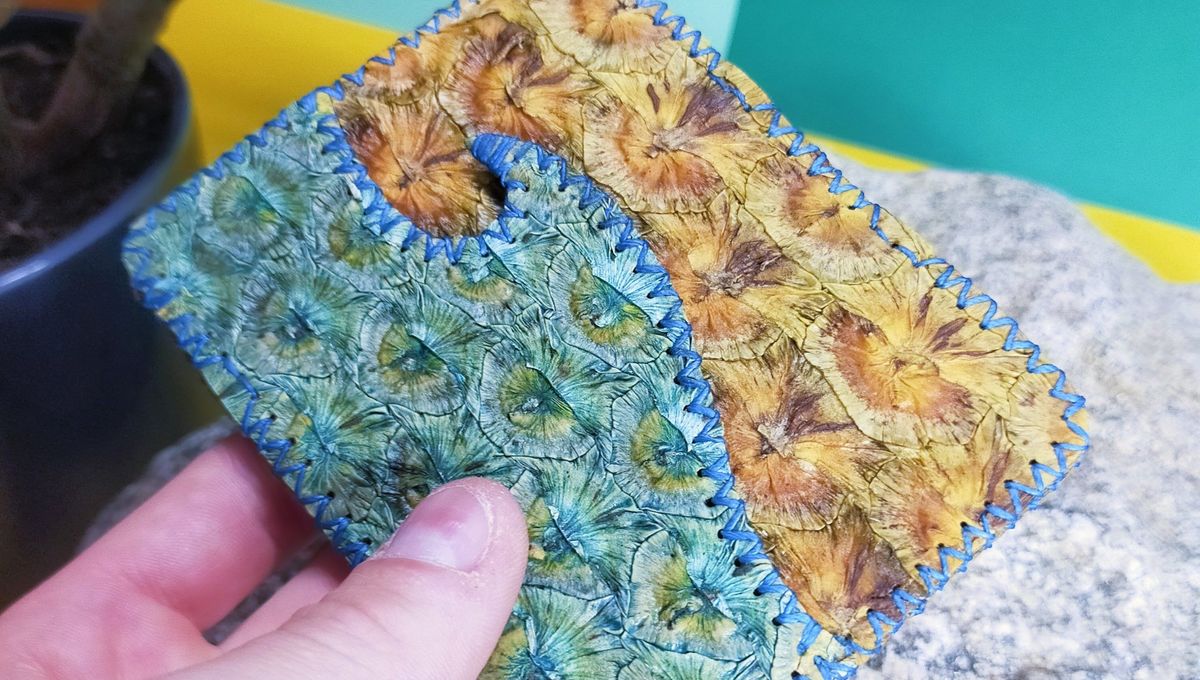A French pineapple leather

Perhaps a future supplier of Parerga, Clément Colin has invented a new way to use pineapple skin to create leather goods accessories. It's different from Pinatex, more raw, less close to leather, but we like it.
For three years, Clément Colin has been developing a unique business with his company Moonkey Créations, in Argol (Finistère): he makes leather goods and jewelry with fruit skins. Soon, he would like to be able to pass on this unique knowledge.
"There are no bad materials, only bad uses ," explains Clément Colin, all smiles. Making leather goods with fruit skin? At first glance, the idea may leave you skeptical, but for this 29-year-old, originally from the suburbs of Brest (Finistère), it's the future.
Living in Argol, he describes himself as a " craftsman, designer and ecologist ". For three years, under the brand Moonkey Créations, he has been using fruit skin to create a whole range of wallets, jewelry, lamps, etc. " The graphics offered by nature are really pretty " , he explains.
In leather goods, which represents the majority of his work, he uses only pineapple skin: " It is the strongest and most fibrous." He also works with melon, grapefruit or orange skin, but only for jewelry or lamps.
Clément Colin sells his products only via his website and also creates custom pieces. His latest original creation: a knife guard made from blue and orange pineapple skin.
Passing on your know-how
Although he started his micro-business three years ago, it is only in the last few months that he has been able to make a living from it. " My plan is not to be super rich, just to live well and help others." His entourage has been particularly supportive: "I don't know if I would have continued without them."
And there is no shortage of projects for this crafts enthusiast. The next step for the craftsman: offering internships to share his know-how. " I should take one or two between now and May-June ," he says. Ultimately, the plant-based leatherworker wants to export his skills internationally.
But before that, his creative process must be patented, until then he keeps the secret of his art. “I want to keep the manual dimension at the heart of my activity.” What he wants to avoid at all costs: his products being manufactured on a large scale, in factories. "Semi-industrialization would be the right compromise," he explains.
Natural materials and short circuits
Ecology and respect for nature are at the heart of his project: all the materials are natural, responsible and come from short circuits.
He collects pineapple skins, his raw material, from Brésil, the Rhum arrangé factory next door. The glue he uses is natural and homemade. The wallets are lined with cork, from small Portuguese producers. And the linen thread is 100% French.
Clément Colin does the 15 to 18 steps required to create his objects in full. Even his fruit press is manual! Problem: it can only hold 18 pineapple skins, which is about eight wallets, and it takes about three weeks for them to dry… The next step: increase the number of presses!
Find the article here:
https://www.ouest-france.fr/economie/artisan/cet-artisan-breton-cree-des-portefeuilles-a-partir-de-peau-dananas-cd16f244-dd2b-11ee-a459-4d0565cc4317



